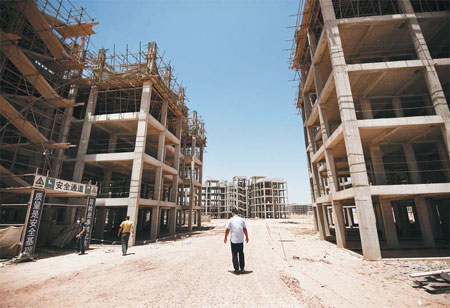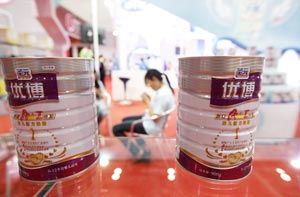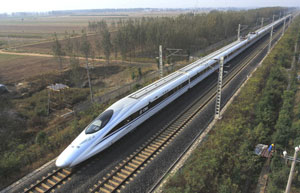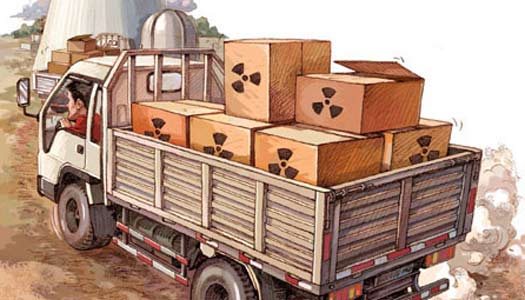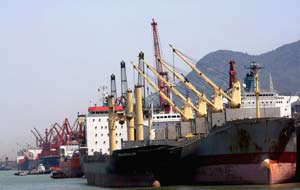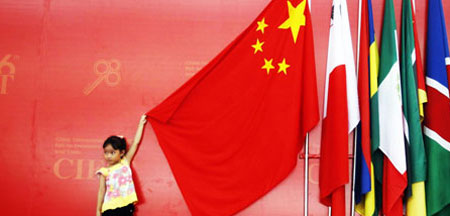Firms awaiting Libya loss compensation
Updated: 2012-04-05 08:04
|
A construction project undertaken by a Chinese company in Libya was halted on June 14, 2011, because of the war in the country. An official at Libya's embassy in China said that it will take time before Chinese companies can return to the nation. [Photo/China Daily] |
Negotiations have not begun over the compensation Chinese companies are to receive for losses they suffered in Libya, meaning more time will be needed before Chinese companies return to the war-torn land.
"The compensation negotiations for the losses that Chinese companies suffered during the war have not started yet," E. Ali Saleh Huwedi, counsellor of the Libyan embassy in China, told China Daily.
Mustafa M. E. Elhmali, a diplomat at the Libyan embassy to China, said that "the compensation will be carried out in accordance with the law and the agreements signed by Chinese companies and their Libyan contractors".
"The Libyan government has formed technical committees to study the damage done to the projects and facilities ... there will not be any difficulties or bottlenecks for Chinese companies," Elhmali said.
"Our duty is to bring the two sides (Chinese companies and Libyan contractors) together and hope they can sit down and talk freely. The compensation will be based on the contracts between the two sides and I believe there will surely be a resolution."
China has no direct investments in Libya but Chinese companies have undertaken 50 contracted projects, worth $18.8 billion, in Libya. Safety concerns in Libya and the current lack of compensation for damage done to the projects are the main obstacles standing before Chinese companies that are preparing to return to Libya, Shen Danyang, spokesman for the Ministry of Commerce, said during a news conference in March.
Libya will hold an election to choose a new government in June, and the country will be more secure then, Huwedi said.
"We welcome Chinese business people to visit Libya to check out and evaluate their project losses," Huwedi said. "And all the losses will be compensated in line with agreements."
Wang Xiyan, manager of the strategy research department of China National Machinery Industry Corp, or SINOMACH, said "most Chinese companies that have business in Libya have been subjected to great losses because most of them underestimated the risks in Libya and neglected to buy disaster insurance for their projects".
SINOMACH has entered into a contract to work on a project consisting of 4,000 residential apartments in Libya and has obtained compensation from a Chinese insurance company for its losses on that project.
Promising prospect
"The trade volume between China and Libya will surge this year and the bilateral relations will improve," Huwedi said.
The embassy is busy issuing visas to private Chinese businessmen who are returning to Libya. At the same time, more and more Libyan businessmen are coming to China to buy consumer goods, he said.
In addition, China can still expand its oil trade with Libya, which increased its output of crude oil from about 800,000 barrels a day in December to 1.4 million barrels a day in March.
"If Chinese companies go to talk with the Libyan government about buying more oil, which is better than what many other producers do, I don't see any objections to that."
China and Libya could cooperate on matters beyond oil trading and project contracts, Huwedi said.
"Libya is a big country and has a large desert," he said. "China is a very, very advanced country in solar energy, and Chinese companies may go to Libya for solar energy investment. The energy can be used in Libya or sold to Tunisia or to Europe, which is very near."
Three Chinese solar energy developers, including Metallurgical Corporation of China Ltd and RTH Solar Energy Application and Technology Co Ltd, have shown interest in making investments in the country, according to Huwedi.
Libya is also inviting Chinese irrigation companies to help it make its deserts usable to the agricultural industry, and Chinese investors to establish hospitals in Libya.
"We hope there is an opportunity for cooperation," Huwedi said.
lijiabao@chinadaily.com.cn
- China offers new hope for wine market
- A never-ending gold rush in China
- China remains top FDI destination
- Regions register faster GDP growth
- Chinese shopping habits changing
- Firms release Q3 reports
- China's Energy Policy 2012
- Bumper harvest expected
- Nuclear plants construction to resume
- Green vehicles
- Overseas firms relocate
- China expands VAT reform
- China Economy by Numbers - Sept
- Solar panel trade dispute
- China opposes US report on Huawei, ZTE
- Sino-Japan economic relationship hurt



